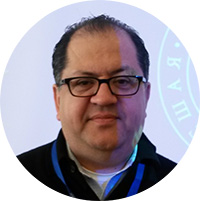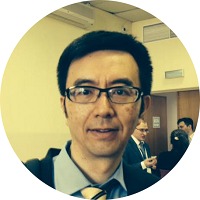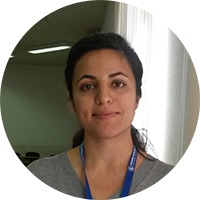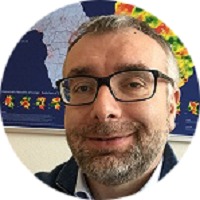'It’s a Great Opportunity to Present Work and to Get Feedback'
The second day of the April International Academic Conference was devoted to sections on various topical economic, political and sociological issues. Questions related to international trade, economic growth, poverty and prosperity, urban economics, social capital and mobility, political regimes were discussed. The international participants of the conference have shared their impressions with HSE News Service.
The second day of the XVI April International Academic Conference was devoted to sections on various topical economic, political and sociological issues. Questions related to international trade, economic growth, poverty and prosperity, urban economics, social capital and mobility, political regimes were discussed. The international participants of the conference have shared their impressions with HSE News Service.

Luis Felipe Lopez-Calva, Lead Economist and Regional Poverty Advisor, World Bank
This conference is very useful – it’s a great opportunity to present work and to get feedback from local researchers. Today we’ve talked about labour market wage inequality in Russia and also fiscal issues analysis and we have looked at the dynamics of income and income inequality in general. I think an important policy question is positive performance that Russia has had in terms of reduction in poverty and inequality and the key question that should be discussed is whether it is sustainable in the years to come. The conference gives a chance to involve academics and policy makers in the discussion that is relevant for the country. I think it’s a very good initiative.
.jpg)
Carolina Sanchez-Paramo, Practice Manager, World Bank Group
I thought the session on ‘Poverty and Shared prosperity in Russia’ was quite interesting. I really liked the results, both on the fiscal and the labour markets. I have worked in Russia for a few years, but I thought this was actually quite interesting and informative because it was related to some of the things that I knew from before. The first discussion was on fiscal policy and distributive impact of fiscal policy and whether it helps the poor or the vulnerable or the rich, and the second part of the discussion was on labour markets, whether wages are growing or not and for whom, for industries or occupations. Both topics are important for scientific community because it is important to analyze the sources of people’s incomes - whether they get it from their jobs or they get it from transfers of from the government. When we look at both, we can actually understand what’s happening.

Dominique Markey, Head of the Department of International Business Communication, University of Antwepren
This morning I participated in a Section on Firms and Markets. Carsten Sprenger gave a very interesting presentation on ‘Does Nationalization Work? — Evidence from Russian State Takeovers’. He is a German colleague, but he’s working at HSE; also Alexander Muravyev from HSE presented his paper entitled ‘Do disclosure and transparency matter for firm value? Evidence from the Russian stock exchange’. I thought it was a very important, high-level paper. I also appreciate that in fact the colleagues from HSE adopt the methodology that is used in Europe and in accredited universities of Belgium.
In fact, our presence here is a bit peculiar, because we came to see how we can sign cooperation conventions with the Higher School of Economics in Moscow. We cooperate with HSE in Nizhny Novgorod, who recommended the Moscow ‘mother’ university. We signed a convention with HSE in Nizhny Novgorod in 2007, which has been renewed several times, and is still going on. We have degree students from Nizhny coming to the University of Antwepren, and we already had one Antwepren student who came to Nizhny. We want to develop this kind of relationship with HSE in Moscow and St. Petersburg. We appreciate the high quality of research at your university, so in Moscow and St. Petersburg we’ll look for conventions on exchanging students and especially researchers. This explains why I’m here, the international office was so kind to invite us, and I must say, being a non-economist, I’m really impressed and I learned a lot of things about Russian economy, and this is very important for me.

Jun Qian, Professor of Finance, Shanghai Jiao Tong University
I think this type of international conferences is very helpful and useful. In China my institute is one of the major organizers of the China International Conference in Finance. What we do is similar to the April Conference – we bring people from all over the world, the US, Europe, and Asia; we basically cover all topics of finance, but we have some sessions specifically devoted to China. The same thing is happening here. These international conferences provide an opportunity for people outside China or Russia to learn what’s going on. I’ve never been to Russia before. But I came here, I’m talking to people, and I feel, even in three days, that I’ve learned a lot more about Russia than from what I read. When I was in the US, I read mass media reports about Russia, and I think a lot of them are wrong. I also read stories in China about Russia, and some of them are not very accurate, or not very complete. So I think as a researcher it’s very important to come here, to talk to people and see their presentations. In the economic study it’s very important to know not just how firms and markets operate, you need to know the political system, the society, the history, the culture – in order to have a better understanding of how markets and firms operate. So, to that extent, this is a really great opportunity.
This type of conferences is also very important because this is where joint research teams can be formed. On one hand, people outside Russia come here to learn, but it’s also important for people here to learn what other people think. When I was outside China, I looked at China from a different angle. Very often countries are doing a lot of things that they believe are good, but it’s valuable to hear why people think you can do better. Sometimes when you are inside a country, your thoughts are restricted, and that’s why I think this type of conferences is really important.

Rengin Firat, Associate Researcher, University of Lyon
The session ‘Trust, Social Capital and Institutions’ was about political and social trust, social capital and xenophobia. In my opinion, it was a great session; I really enjoyed it as discussant. I liked all the topics, it’s hard to pick one, as they are all appealing to my research interests, which are social capital and social trust.
All of the topics deserve special attention of the scientific community, especially topics on social capital. It’s like glue of our society as it brings people together. Xenophobia is also important because it’s very problematic and damaging for the society. The conference’s practical benefit for researchers is social networking, as we meet the people and have a chance to exchange our ideas. It’s very good for our future research projects as well as for scientific community in general.
.jpg)
Miren Lafourcade, Professor in Economics, Paris School of Economics
Our first session today was more on the theoretical aspects of international trade. The main conclusion there was that it’s very important to take into account the fact that different firms might have different size and different productivity and that small and big firms do not behave in the same way. The papers presented during the second session dealt with spatial and urban economics. The first talk was a very nice model useful in the theory of central places that seeks to explain the number, size and location of settlements in an urban system. The second paper addressed the importance of taking into account the fact that there might be some intermediaries between the buyers and the sellers of a house. Such intermediaries in countries like India can increase the price a lot.
My talk was focused on the issues of pollution and fuel consumption linked to the urban form. We’ve shown than very large cities are surprisingly quite ecological thanks to very good public transit systems. Small cities, of course, are also very ecological – they have very low carbon footprint because they are very centralized and bring together the workplaces and the residents. Medium cities, however, do not capitalize on either advantage. It would be interesting to do similar research in Russia with the data on Russian cities. Perhaps we could do a joint project with Russian researchers. I am not an expert on Russian cities but I believe that urban sprawl is also a problem here. Such big cities like Moscow, which has a very nice metro system, could be certainly good for research.

Fabrizio Zilibotti, Professor, Zurich University
It is my greatest pleasure to be invited and to deliver a speech at this event. It is my first time in Moscow. I had a very good impression of the city and of the event itself. Yesterday I attended the session on the future of the economic growth in Russia. There were many interesting conclusions and of course it is a difficult juncture for Russian economy, but I thought the discussion was very enlightening as different concerns were expressed. I was inspired by the comments of German Gref, the CEO of Sberbank, who talked about human capital formation and what factors are important there.
Today I contributed to the session which focuses on the role of culture and values for economic development. It was really nice to have different perspectives from political science to sociology. We also tried to say something from the economic side, and particularly we talked about how parents grow their children in different countries. I hope this will be the beginning of a long line of cooperation.

